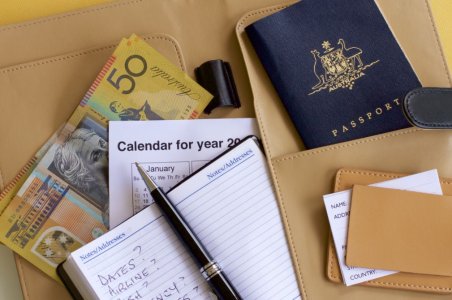Here’s how much more you'll be paying for your Australian passport in 2024
- Replies 4
Travelling is a joy for many, and we here at the SDC are no different. Whether it’s a trip overseas or exploring Down Under, we all value the opportunity to explore new places, learn about other cultures, and meet fresh faces if given the chance.
However, the cost of travel is about to get steeper for Australians next year, with reports stating there would be a significant price hike for passports on the horizon.
Treasurer Jim Chalmers has announced that passport fees will increase not once but twice in 2024, making the already expensive Australian passport costlier by next year.
Currently, an adult passport, valid for 10 years, costs $325. However, from January 1, 2024, the cost will be adjusted to the consumer price index.

Then, from July 1, passport fees will see a further increase of 15 per cent. This double whammy is expected to result in Australians paying an additional $50 to renew their passport.
This ‘relatively modest change’ was justified by the treasurer during the recent Mid-Year Economic Outlook meeting.
He said: ‘The funds from this one-off increase are all about making sure we can resource our passport systems and make them modern and fit for purpose.’
‘Especially at a time when there are ongoing threats to people’s security and their identity,’ he emphasised.
He also explained that the price hike is projected to raise $349 million over three years.
‘The change will mean that the new cost of an ordinary adult passport is still less than $40 a year over that 10-year period where people get passports,’ he shared.
Meanwhile, the Foreign Affairs Department stated that the additional fees will be used to modernise passport systems.
They highlighted the benefits of holding an Australian passport, which includes visa-free access to more than 100 countries.
‘This will ensure that Australia can stay ahead of the game in addressing rapidly evolving and more sophisticated threats to identity security,’ a spokesperson explained.
The announcement of the passport price hike came during the mid-year federal budget update, which Chalmers released on Wednesday, December 13.
The updated documents showed wage growth moving ahead of consumer price increases by early 2024, as was forecasted in May.
However, near-term inflation forecasts have reduced the size of the real wage increase by half a percentage point in 2023/24, adding pressure to households who already have strained budgets.
The budget update also revealed a stronger-than-expected inflationary pulse, with the report attributing higher global oil prices as the main factor.
Despite this, consumer prices are expected to return to the target band by June 2025.
The budget update also revealed a surprise revenue boost from high commodity prices, like iron ore, and a higher income tax take in a strong labour market—a smaller deficit of $1.1 billion is predicted for 2023/2024, down from the $13.9 billion originally forecasted in May.
According to the treasurer, this puts the budget within 'striking distance' of a second surplus.
‘We’ve been deliberately cautious and deliberately conservative—we’ve seen in recent times, under our predecessors, what happens when you over-promise and under-deliver,’ he claimed.
Moreover, almost $40 billion in total has been cleared off deficits for 2026/2027.
Chalmers emphasised the government's commitment to responsible economic management. He shared that 92 per cent of the upward revisions to revenue were being banked, which then helps alleviate debt and inflationary pressure.
The Australian Passport Office has not provided further information on the upcoming changes as of publishing.

What are your thoughts on the upcoming price hike, members? How will this affect your travel plans? Share them all with us in the comments below.
However, the cost of travel is about to get steeper for Australians next year, with reports stating there would be a significant price hike for passports on the horizon.
Treasurer Jim Chalmers has announced that passport fees will increase not once but twice in 2024, making the already expensive Australian passport costlier by next year.
Currently, an adult passport, valid for 10 years, costs $325. However, from January 1, 2024, the cost will be adjusted to the consumer price index.

Australians will soon need to fork out more money just to travel due to an increase in passport fees. Credit: Shutterstock
This ‘relatively modest change’ was justified by the treasurer during the recent Mid-Year Economic Outlook meeting.
He said: ‘The funds from this one-off increase are all about making sure we can resource our passport systems and make them modern and fit for purpose.’
‘Especially at a time when there are ongoing threats to people’s security and their identity,’ he emphasised.
He also explained that the price hike is projected to raise $349 million over three years.
‘The change will mean that the new cost of an ordinary adult passport is still less than $40 a year over that 10-year period where people get passports,’ he shared.
Meanwhile, the Foreign Affairs Department stated that the additional fees will be used to modernise passport systems.
They highlighted the benefits of holding an Australian passport, which includes visa-free access to more than 100 countries.
‘This will ensure that Australia can stay ahead of the game in addressing rapidly evolving and more sophisticated threats to identity security,’ a spokesperson explained.
The announcement of the passport price hike came during the mid-year federal budget update, which Chalmers released on Wednesday, December 13.
The updated documents showed wage growth moving ahead of consumer price increases by early 2024, as was forecasted in May.
However, near-term inflation forecasts have reduced the size of the real wage increase by half a percentage point in 2023/24, adding pressure to households who already have strained budgets.
The budget update also revealed a stronger-than-expected inflationary pulse, with the report attributing higher global oil prices as the main factor.
Despite this, consumer prices are expected to return to the target band by June 2025.
The budget update also revealed a surprise revenue boost from high commodity prices, like iron ore, and a higher income tax take in a strong labour market—a smaller deficit of $1.1 billion is predicted for 2023/2024, down from the $13.9 billion originally forecasted in May.
According to the treasurer, this puts the budget within 'striking distance' of a second surplus.
‘We’ve been deliberately cautious and deliberately conservative—we’ve seen in recent times, under our predecessors, what happens when you over-promise and under-deliver,’ he claimed.
Moreover, almost $40 billion in total has been cleared off deficits for 2026/2027.
Chalmers emphasised the government's commitment to responsible economic management. He shared that 92 per cent of the upward revisions to revenue were being banked, which then helps alleviate debt and inflationary pressure.
The Australian Passport Office has not provided further information on the upcoming changes as of publishing.
Key Takeaways
- The cost of an Australian passport is set to increase twice in 2024, linked to the consumer price index and a further 15 per cent hike from July 1.
- Treasurer Jim Chalmers has described the price change as a 'relatively modest' move designed to fund improvements to passport systems and address security threats.
- The increased fee is expected to generate $349 million over three years and amount to an extra $50 for Australians renewing their passport.
- The Foreign Affairs Department stated that the extra fees would help modernise passport systems and maintain Australia's global edge against identity threats.







